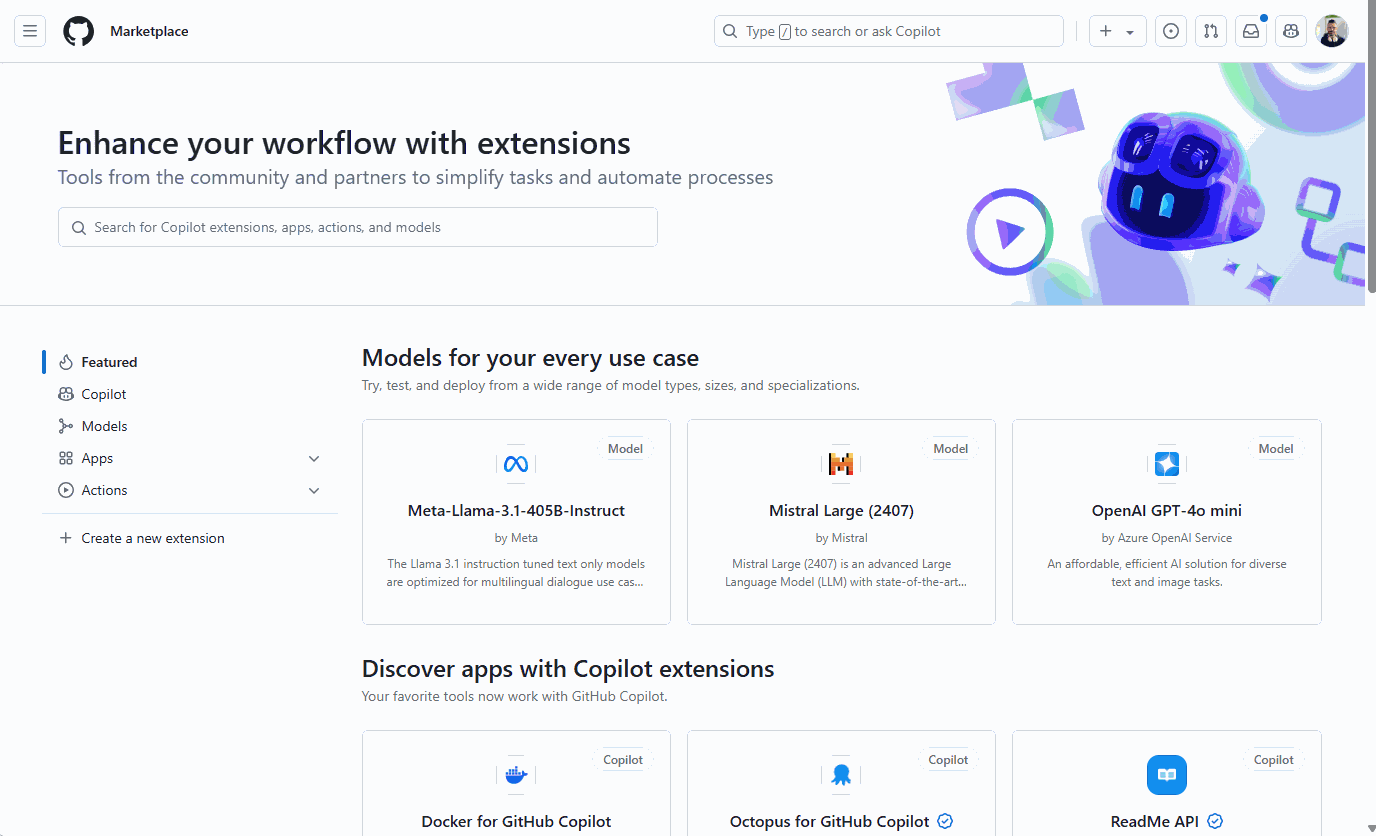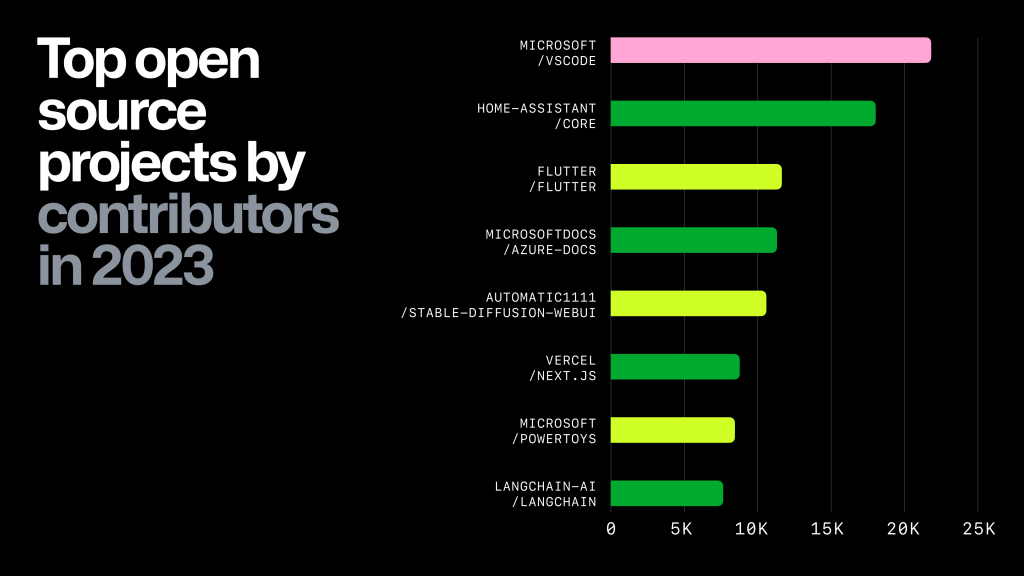5 of Microsoft's Fastest-Growing Infrastructure Products of 2024
Discussing Microsoft's role in tools for software engineers, AI developers, security and data governance
Microsoft is the world’s largest infrastructure software company. From security to developer tools, databases, and AI, Microsoft is a formidable competitor in nearly all compelling infrastructure product categories. The success of its products serves as a bellwether for what enterprise executives are prioritizing and purchasing. Since the Steve Ballmer era, Microsoft has aggressively pursued “developers” to stay ahead of new trends. Today, Microsoft owns the largest developer platform (GitHub), the largest security platform (Microsoft Security), and the largest AI platform (OpenAI).
In this piece, we cover 5 of the fastest growing Microsoft products and discuss implications for competitors in its line of vision.
Github Models
Microsoft’s acquisition of GitHub crowned Microsoft king of open-source software development. Building on this foundation, Microsoft is now venturing into the AI domain with GitHub Models. GitHub Models every developer into an AI engineer by providing direct access to leading AI models within the familiar environment of GitHub. With over 100 million users, GitHub Models leverages the extensive community to foster innovation and democratize AI development. This launch positions Microsoft to compete with platforms like Hugging Face by offering a seamless integration of AI tools and resources that developers can use from experimentation to production.
GitHub Models makes AI model development easier by offering a built-in playground where developers can test models like Llama 3.1, GPT-4o, and Mistral Large 2 for free. Users can try different prompts and model settings directly within GitHub. Once developers are ready, they can move their models to production using Codespaces and Azure AI. This setup ensures strong security and data privacy. By providing easy access to various AI models and reliable deployment options, GitHub Models lowers the entry barrier for AI development, helping more developers become AI engineers and strengthening Microsoft’s role in the open-source AI community.
Azure AI Services
Microsoft is keen to dominate AI compute workloads by offering exclusive access to models like those from OpenAI. It’s also investing in open-source model development through GitHub Models and partnerships with developers like Mistral AI. What Microsoft hopes is that if it has the best models and best access to data, Azure AI Services will win the compute. The strategy to win AI workloads is working, with over 6% of overall Azure revenue being tied to Azure AI services — remarkable given this was ~0% just a year ago!
Azure AI Services reached $5 billion run rate this quarter, up 900% year-over-year. The service now supports 60,000 customers, marking a 60% increase from the previous year. Azure AI Services provides a range of tools for integrating AI capabilities into AI applications, including language understanding, speech recognition, computer vision, and decision-making. Its suite of tools like Azure ML and Azure OpenAI Service enable developers to build, train, and deploy AI models efficiently, leveraging Azure’s computational power and strong security features.
Today, Microsoft and NVIDIA announced a partnership to more tightly integrated software and hardware for AI applications. This tight integration more deeply integrates NVIDIA’s GPUs and InfiniBand networking with Azure AI, enhancing the performance and scalability its workloads. By offering this optimized environment, Azure AI is aiming to be more efficient and performant than peers like AWS, which don’t offer the same level of integrated hardware acceleration for AI workloads.
Microsoft Purview: Data Governance
In July, Microsoft announced the general availability of its Purview Data Governance solution for managing, understanding and governing enterprise data. Data governance is a growing priority for security and data teams, with Microsoft reporting a 200% month-over-month growth rate in Purview.
Microsoft Purview enables enterprise-wide data governance by providing tools for data discovery, curation, and quality management. Users can search their entire data stack using simple terms and natural language, organize data with business concepts, and gain end-to-end visibility into how data quality impacts their data assets. Purview’s federated governance model allows business units to manage their own data while adhering to centralized policies. This approach enhances data visibility and management through natural language processing, enabling users to interact with data using simple queries.
Github: Enterprise and Copilot
GitHub has been crucial for Microsoft in maintaining a leading edge in the infrastructure software landscape, offering direct insight into open-source developments. This strategic vantage point helps Microsoft stay aligned with emerging trends and technologies.
Highly recommend reading the GitHub Octoverse 2023 report describing all kinds of informative data points on the open-source ecosystem:
GitHub Copilot has quickly become an essential tool for engineers reaching $300 million of ARR and accounting for 40% of GitHub’s overall growth this year. The tool now exceeds the size of GitHub at the time of its acquisition by Microsoft ($7.5B in 2018). With 77,000 organizations using Copilot, up 180% year-over-year, its adoption has been category defining for AI coding tools. In the past year alone, 92% of developers have used AI-based coding tools — with CoPilot being by far the most popular. CoPilot cites 55% faster coding, improved workflow for 73% of developers, and reduced mental effort in repetitive tasks for 87% of users.
Overall, GitHub’s run rate has doubled to $2 billion since September 2022. The platform saw a 38% increase in the number of private repositories in 2023, which now account for more than 81% of all activity on GitHub. These statistics highlight GitHub’s vital role in the software development ecosystem — which has only grown stronger under Microsoft’s ownership.
Copilot for Security
Microsoft Copilot for Security has been adopted by 1,000 customers since its launch in April. As the largest security vendor globally and posting over $20B of annual security revenue, Microsoft has the distribution to test new security products like Copilot for Security within its vast enterprise customer network. This AI-powered tool allows users to ask security-related questions in natural language and receive actionable responses within seconds.
Copilot for security helps manage vulnerabilities, expedite investigations, generate and summarize access policies, and configure devices with best practices. Copilot also identifies data and user risks and discovers attack paths affecting cloud workloads, making it a comprehensive solution for modern security needs.
Conclusion
Microsoft is a stronger competitor than ever in all things infrastructure with its products in security, developer tools, databases, and AI. Their strategic investments and acquisitions, such as GitHub and partnerships with NVIDIA, keep them at the forefront of emerging trends. In many cases, Microsoft is ahead of the cutting edge startups in integrating new technologies like AI.
With Microsoft out and ahead in integrating many AI features, the bar for product differentiation among new startups to compete with Microsoft in infra is high.









